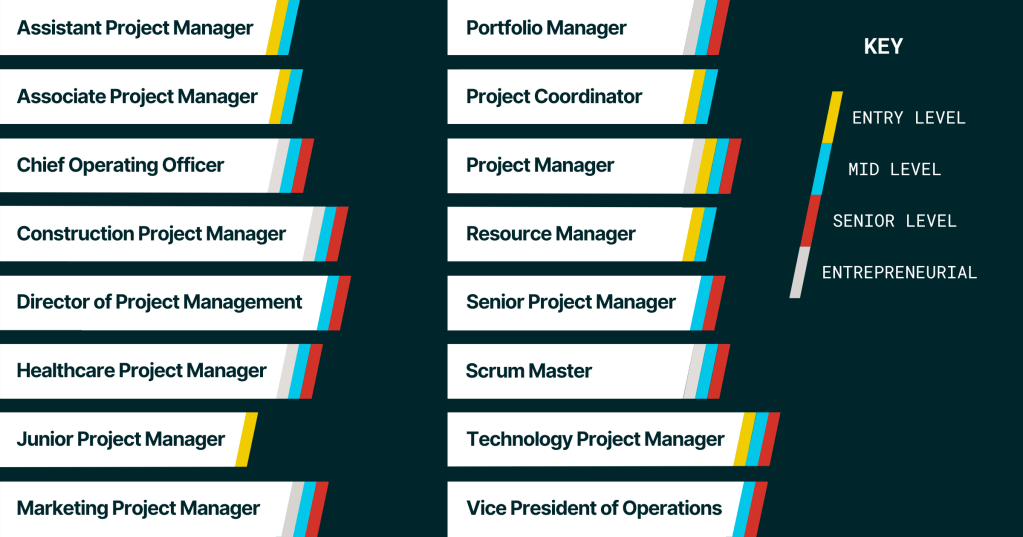A career in project management is both rewarding and dynamic, offering ample opportunities for career growth and workplace diversity. This profession demands a unique skill set, including exceptional problem-solving and communication abilities and the capacity to juggle multiple tasks and adapt swiftly to changing circumstances. Project managers serve as leaders and decisive decision-makers, actively contributing to every facet of their assigned projects. Ultimately, they are responsible for ensuring the success of complex endeavors across various sectors such as construction, engineering, law, healthcare, marketing, and technology, among others. Given the versatility of this role across industries, developing a strong foundation in general business knowledge and technical skills is key to establishing a prosperous project management career.
Here are a few data points to give you an idea of what the project management field offers and where it’s heading.

Let’s review this skill set together by discussing how project management expertise can be acquired, applied, and transformed into a fulfilling career.
What can I do with project management skills?
A project manager is a professional who organizes, plans, and executes projects while working within restraints like budgets and schedules. Project managers lead entire teams, define project goals, communicate with stakeholders, and see a project through to its closure. Whether running a marketing campaign, constructing a building, developing a computer system, or launching a new product, the project manager is responsible for the success or failure of the project.
Throughout the lifecycle of a project, the project manager is responsible for a variety of tasks. These tasks typically include:
- Defining the scope of the project
- Staying on schedule
- Planning a project’s cost and sticking to a budget
- Managing project resources (including teams and workers)
- Documenting the progress of the project
- Communicating with stakeholders
- Assessing risks
- Troubleshooting
- Leading quality assurance
The inherent diversity of responsibilities ensures that each day on the job, as well as each project, brings a unique set of challenges and tasks. Your daily routine could entail interviewing and hiring new talent, managing team meetings, reallocating resources to cover an unexpected expense, or providing project updates to stakeholders.
Listen as Daina Argueta, a technical project manager at SAS, shares their experience working in the field of project management. Their insights shed light on the essential skills required to excel in the diverse landscape of daily tasks.

I think that the most valuable skill set for a Technical Project manager is curiosity. I’ve noticed that in the positions that I’ve been in since I’ve transitioned it really doesn’t matter how much you know out the gate, it’s whether or not you’re willing to continually learn. And I think to be patient and curious is really what you need as a technical project manager. But another viable set would probably be patience. We’re not always going to have the answers and so sometimes, I think it’s really valuable when you have individuals who can take a breather, say they’re not sure but they will find out. I think for me those are skill sets that are just invaluable along with obviously time management skills and being able to jungle multiple fires at once. Someone at my position said that the best example they could have for a project manager was that trying to drink out of a fire hydrant and every client is a new fire hydrant. And I really loved that because it’s just the perfect example of what you’re balancing on a day-to-day.
Discover your career opportunities
Acquiring basic project management skills opens up a wide range of career opportunities around the world.

Expert advice
“When you begin your job search, use key terms to identify opportunities that align with your interests. Project management roles can vary significantly from company to company and industry to industry. Searching by skills, technical terms, or other key terms will yield better results and drastically shorten the time you spend searching for roles on job boards.”
– Christine Cherian, career expert at edX

How can I acquire project management skills and turn them into a career?
If you’re interested in pursuing a career in project management, we recommend taking these steps:
Thorough research plays a pivotal role in every profession, and the field of project management is no different. Utilize the wealth of information at your disposal, whether that involves conducting online searches for relevant job titles, tuning in to industry-specific podcasts, or establishing connections with professionals in the domains or roles that captivate your interest.
Pro tip:
Explore your career possibilities. As part of your research, take every opportunity to learn more about topics in your desired field. Browse the edX course catalog at edx.org to see what project management-related topics, courses, and programs interest you, and start advancing your career in project management today.
A critical component of the research phase is networking, yet it is often underestimated in its impact on your career journey. To gain a clearer understanding of your career objectives and aspirations, invest time in conversing with industry professionals to learn about their daily experiences. Insights gathered from these networking interactions will help you determine if a career in project management aligns with your interests, desires, and requirements.
As you forge connections through networking, remember that the essence of effective networking lies in fostering long-lasting relationships. Continue to nurture your professional connections. When you’re prepared to explore career opportunities, you’ll already have a network of relevant experts to seek advice from or request referrals, giving you a substantial advantage.
Pro tip:
We strongly encourage arranging informational interviews as a valuable means of gaining insights and building connections with project management professionals and hiring managers. Engaging with people in your field can open up opportunities to learn new skills, gain valuable guidance, and potentially lead to job referrals.
Check out our Networking Guide and Outreach Templates and Resources for help getting started.
In addition to gaining insights into the professional journeys of others, it’s crucial to maintain a clear vision of your own career objectives and ambitions. Project management offers a wide range of paths towards achieving your ideal career, each with unique opportunities. As you engage with industry professionals, remember to periodically reflect on your aspirations because the possibilities are limitless.
You need a whole range of skills to be a successful project manager. They may be skills you already use in your day-to-day life, as well as job-specific abilities developed through education and training. Project management skills are also highly transferable, which makes them valuable across many industries.
Regardless of the industry, project managers must have a solid grasp of business concepts like risk analysis and supply chain coordination. They also need to possess a variety of soft skills, including the ability to think strategically under stressful situations while deftly communicating with team members, company directors, and stakeholders.
Nevertheless, the most prized and in-demand skills for project managers include:
Communication — Because project managers often act as intermediaries between company executives, stakeholders, team members, and the public, they must be able to relay information thoroughly and strategically. Effective communication via multiple channels ensures that the team fully understands and continues to make progress toward project goals.
Leadership — As leaders, project managers work toward what is best for individual employees and the company at large. Effective leadership consists of interpersonal respect, honesty, and the ability to keep promises. Project managers also need to resolve conflict in a fair manner, whether it arises between team members or between the organization and its stakeholders.
Resource management — All projects contain limitations in terms of time and funding. It is the project manager’s job to allocate resources efficiently through careful pre-planning and scheduling. Through these processes, project managers create transparency and build a safety net when unforeseen problems arise.
Critical thinking — Project managers are tasked with resolving complex problems by analyzing relevant data, consulting experts, and implementing creative solutions. Critical thinking is integral to successfully managing these tasks. Critical thinking also plays a key role in pre-planning, which enables managers to pick the best strategies to maximize return on investment.
Flexibility — Projects can behave like living things, constantly evolving as they move toward completion. Project managers need to quickly adapt to any changes, guide their team, and avoid temporary setbacks or complete failures. Flexibility also allows project managers to multitask without succumbing to stress and burnout.
With a strong foundation and the essential skills listed above, you will be able to explore a multitude of options in the field of project management.
Expert advice
“You don’t have to have a leadership role to develop project management skills. Think about ways that you stand out in your current role or at school. Consider processes that you lead, the meticulous documentation you maintain, the ways you proactively communicate with your managers or teammates, or problems you have successfully helped solve. Also, identify the areas of opportunities and seek ways to improve. Ask for feedback from your managers or people you trust on ways you can improve your project management skills.”
– Tramaine Isaac, career expert at edX

Continuing education plays a crucial role in long-term career success for project management. It is important that you find ways to keep learning and growing in your field. The good news is that you don’t have to look very far to uncover an enriching learning opportunity. Here are a few options to consider:
Self-education — If you want to learn asynchronously, informally, or casually, self-education is a great place to start. Many approaches to this continuing education option supports a variety of career goals, budgets, learning styles, and time commitments. You can read relevant books, articles, and research papers to expand your project management knowledge and stay abreast of news and trends. You can also watch relevant videos, listen to relevant podcasts, and engage with other forms of multimedia to help increase your project management knowledge.
Online Courses — If you prefer a more structured or socialized learning experience, online courses might be a good option. edX.org offers several instructor-led and self-paced project management courses that may be of interest.
Professional certifications — While not mandatory, certifications can significantly bolster your skill set and elevate your competitiveness as a well-qualified candidate within your industry. You may find it worthwhile to explore the various certificate programs related to project management available on edX.org.
Boot camps — Experienced curriculum teams design these innovative programs to help you achieve your career goals in a fraction of the time it takes to complete a traditional degree. With many boot camps lasting just 3–12 months, you’ll be amazed at how quickly you can gain the knowledge and expertise you need to launch your dream career.
Project management degree — Pursuing a degree in project management is an excellent choice if you want to gain a comprehensive understanding of the rich history, intricate theories, concepts, and cutting-edge innovations that have contributed to shaping the world of project management.
Developing a professional portfolio that spotlights your unique project management ability, including your management of a diverse project portfolio, your strategic decision-making prowess, your adept handling of risks, and your problem-solving abilities to advance business objectives presents an outstanding opportunity to set yourself apart. The creation of a visual portfolio also serves as valuable preparation for interviews, acting as a prompt for recalling the triumphs and trials you’ve encountered. Beyond simply guiding the direction of your narratives, the portfolio ignites deeper discussions anchored in your achievements.
Throughout the interview process, hiring managers evaluate your competencies, capabilities, and adaptability. Your portfolio serves as your advocate even before the interview begins, proving that you are the most qualified project manager for the position.
As you construct your portfolio, it’s vital to prioritize your audience’s needs while safeguarding sensitive information. Here are some pointers for constructing an outstanding portfolio:
Tailor content for your audience — Customize your portfolio to cater to the specific needs and interests of your intended audience.
Highlight key achievements — Showcase your most noteworthy accomplishments and how they contributed to the success of projects and business objectives.
Emphasize problem-solving skills — Illustrate instances where your problem-solving abilities played a pivotal role in overcoming challenges.
Address risk management — Demonstrate your expertise in managing risks and ensuring project stability.
Maintain confidentiality —Be cautious not to divulge sensitive or confidential information in your portfolio.
Visual appeal — Create a visually engaging portfolio that captivates the viewer and effectively communicates your achievements.
Preparation — Utilize your portfolio to prepare for interviews, helping you recount your experiences and articulate your value as a project manager.
By following these guidelines, you can develop a compelling portfolio that effectively communicates your prowess as a project manager while respecting confidentiality and catering to your audience’s expectations.
Helpful resources:
The career team at edX has resources and workshops to help you fine-tune your application materials and prepare for interviews. Start with the Behavioral Interview Prep Guide to help you prepare for interviews.
Once you’ve secured your initial foothold in project management, don’t forget to celebrate your achievements. The career journey is filled with its fair share of highs and lows, and we firmly believe that every triumph merits recognition.
That being said, this is not the culmination of your journey; it’s just the beginning. Embrace the process, be patient with yourself, and realize that career trajectories are seldom straightforward.
Here are some of the ways that you could continue growing within the field of project management:
Continuous learning — Make it a habit to explore our extensive course catalog on edX.org for ongoing educational opportunities. Now that you’ve taken your first steps in your career, there’s always value in refreshing your skills, deepening your industry knowledge, or delving into related subjects that can enrich your work or align with your interests.
Expert advice
“Continuous learning is the key to a healthy career! Surrounding yourself with people who share this value is also important. Align yourself with people who are positive and forward-thinking. Engage in conversation about your career field or opportunities for growth. Doing this will keep you motivated and encourage healthy competition as you and your like-minded peers celebrate one another’s wins and push each other to be your best.”
– Tramaine Isaac, career expert at edX

Advancement — Advancing in your project management career can vary significantly depending on the industry, role, function, and the type of projects you own. You may find yourself progressing to the role of a senior project manager, or you might even consider venturing into entrepreneurship by establishing your own project consulting company.
Career shifts — Periodically assess your contentment with your daily responsibilities. If you discover that your current role doesn’t satisfy you, take the time to analyze what aspects you enjoy and what you find less appealing. Keep an eye out for growth opportunities within your organization and be open to pursuing career shifts that leverage your background, skill set, and passions.
Remember, your career is a dynamic and evolving journey, and embracing change and continuous learning will be instrumental in your long-term success in project management.
What could my career look like with a project management skill set?
It is difficult to say exactly what your life would look like with a project management skill set, but we can provide some insight. Consider how the following insights from the Project Management Institute’s Global Project Management Job Trends (2023) report may factor into your career journey:
Project talent is in demand — Millions of people will be needed each year to fill all of the project management-oriented positions expected to open by 2030. To remain competitive, companies will need to focus on hiring problem solvers, relationship builders, and tech-savvy project talent who can help them drive change and deliver strategic value.
Project management professionals possess skills to succeed — Across nearly all sectors, communication is the most important skill to possess, according to project professionals surveyed in the PMI Pulse of the Profession (2023) report. Overall, 68% of respondents said it was the most critical skill – followed by problem-solving (65%), collaborative leadership (62%), and strategic thinking (58%).
Project activity in many sectors will increase — With the current global economic challenges, budgets will tighten, but project activity in many sectors will continue as companies aim to keep up with rapidly changing technology cycles and adapt to lingering disruptions from the pandemic. Most notably, the financial services, healthcare, and technology sectors will see the most activity and growth.
Expert advice
“My day-to-day usually looks like a meeting with our whole team going over action items for the day and the coming week and then it will follow with client meetings. I typically have between 1 and 6 meetings in a day; throughout the day I’m documenting action items, working with the sales team and other teams to make sure our clients are getting what they want out of the product. It’s very different from teaching and I enjoy every second of it.”
– Daina A., technical project manager

What are my next steps?
Learn more about project management:
Register for a course on edX to learn about a variety of topics within the field of project management, such as “Agile Project Management,” “Risk Management for Projects,” and “Technology Project Management.”
Watch a session
Watch a relevant session on our Events page to learn more about the industry and other professionals’ experiences within it.







